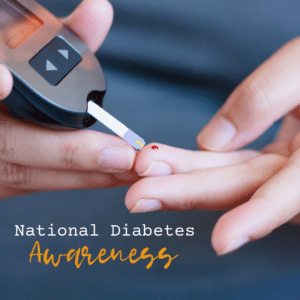November is National Diabetes Awareness Month
Awareness, being informed, taking action, and connecting to the appropriate support make a huge difference in managing diabetes.
We CARE about awareness. At CARE Counseling, our clinicians can assist with managing symptoms such as depression related to medical health concerns. We welcome care coordination/ referrals from primary health and specialty care providers. We are trained in managing mental health distress and have a clinician on staff with a special interest in Type 1 Diabetes.
Check out the following stats on diabetes:
-
- More than 34 million Americans have diabetes (about 1 in 10), and approximately 90-95% have type 2 diabetes
- Diabetes is the 7th leading cause of death in the United States
- Nearly 1.6 million Americans have type 1 diabetes- up nearly 30% from 2017
- Type 1 diabetes is growing most sharply in African American and Hispanic youth populations (33.5% were ages 10-14, 27% were 5-9)
- Type 2 diabetes disproportionately affects racial/ ethnic minority women
- 1 in 5 adults with Type 2 diabetes has depression
- 1 in 3 adults with Type 2 diabetes experience diabetes distress (worry, stress, frustration, & burnout from managing diabetes)
- In any 18-month period, 33% to 50% of people with diabetes have diabetes distress
Source: https://www.cdc.gov/diabetes/
Do you know the difference between Type 1 and Type 2 Diabetes?
Type 1 Diabetes
In type-1 diabetes, the body does not produce insulin. The body breaks down the carbohydrates you eat into blood sugar that it uses for energy—and insulin is a hormone that the body needs to get glucose from the bloodstream into the cells of the body.
Type 2 Diabetes
In type-2 diabetes, the body doesn’t use insulin properly. Some people can control their blood sugar levels with healthy eating and exercise, but others may need medication or insulin to help manage it. Type 2 Diabetes often develops in people over age 45 but can also develop in children through young adults.
What about Gestational Diabetes?
Gestational diabetes is a form of high blood sugar that impacts pregnancy in mothers. In gestational diabetes, diabetes develops for the first time during the mother’s pregnancy They may develop insulin resistance which makes it difficult for the body to use insulin. The pregnant body may also not be able to make and use all the insulin it needs for pregnancy. The ADA explains that “without enough insulin, glucose can’t leave the body and be changed into energy. When glucose builds up in the blood, it is called hyperglycemia”.
Nearly 10% of pregnancies in the U.S. are affected by gestational diabetes each year, according to the American Diabetes Association. Most of the time it will go after having the baby; however, the mother is at risk for later developing Type 2 Diabetes and the child is at risk for obesity and Type 2 diabetes.
Here are several ways to help manage diabetes:
BE INFORMED
Educate yourself about diabetes, depression, and diabetes distress
Access information on eating healthy and develop healthy eating plans
Have information on exercising and develop exercise plans
Be aware of medical and mental-health-related resources
Understand how to take prescribed insulin, and other injectable or oral medications
Know how to properly care for your diabetes supplies
SCREEN
Do regular diabetes screenings
Watch blood pressure levels
Watch cholesterol levels
Regularly check blood sugar and record results
Include alerts to help monitor results and potential warning signs
Do mental health screening for depression
Discuss mental health concerns with your care team
REFER
Connect with a healthcare team for diabetes self-management education
Coordinate care for medication management
Seek a referral to specialty providers such as an endocrinologist for diabetes care
Refer to support services to help develop healthy lifestyle goals
Connect with a mental health provider to reduce symptoms of depression and/ or diabetes distress
Join a diabetes support group
Sources: Center for Disease Control and Prevention and the American Diabetes Association
Written by Charlotte Johnson MA, LPCC
We’re Here to help
Our wellness experts will be happy to take care of you. You can CLICK HERE to schedule an appointment now or call (612)223-8898.
Meet Clinicians
We’re united by our commitment to providing effective, relevant, and innovative mental health support at all stages of your journey. Click Here to find out more about who we are, where we come from, and how we live out CARE’s mission every day.
The professionals at CARE are actively collecting and creating resources to help with what you need. We’re Here for You.




